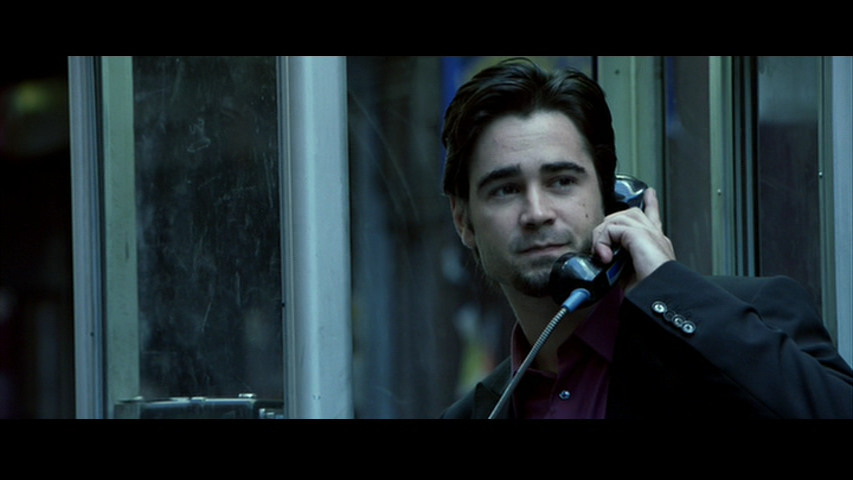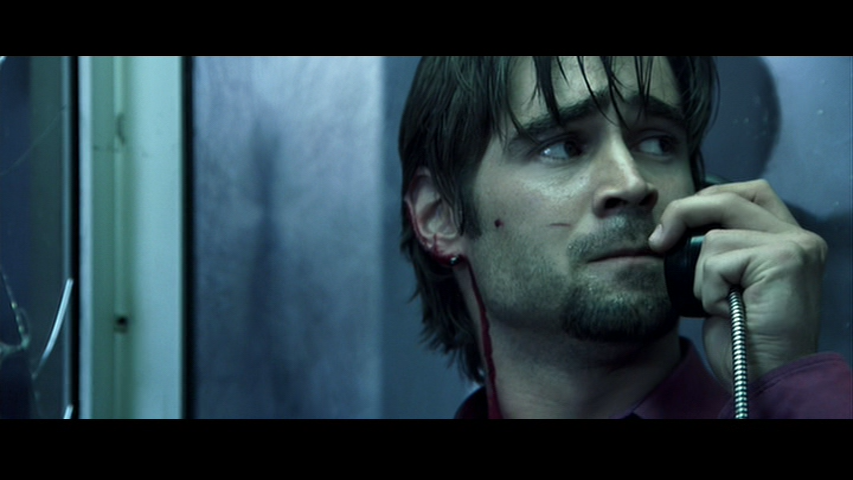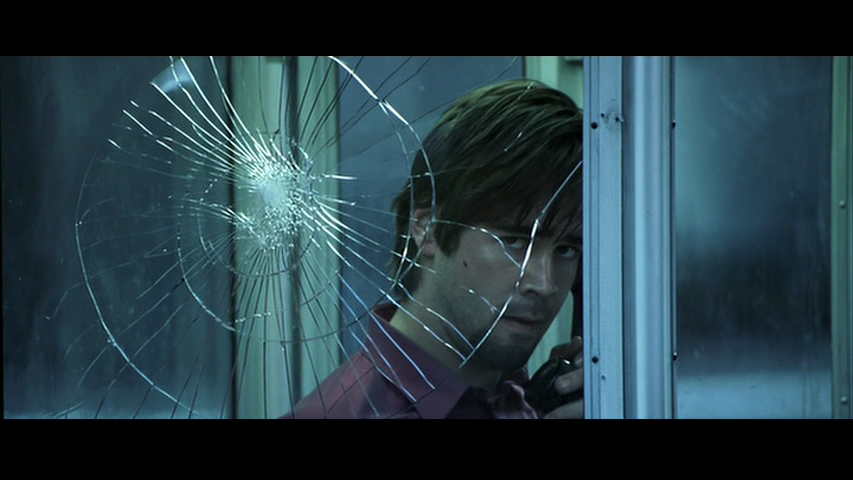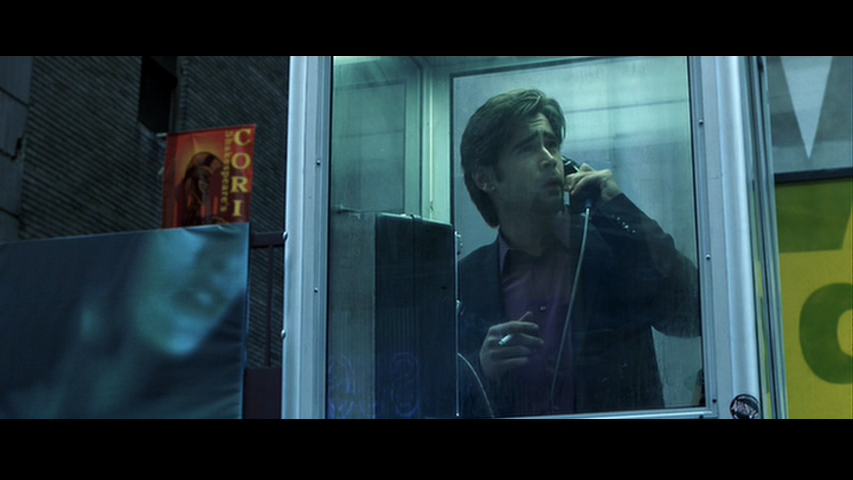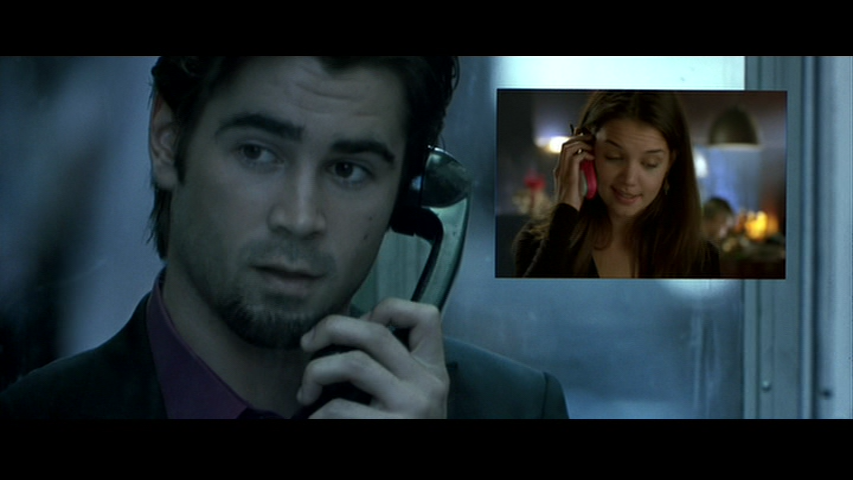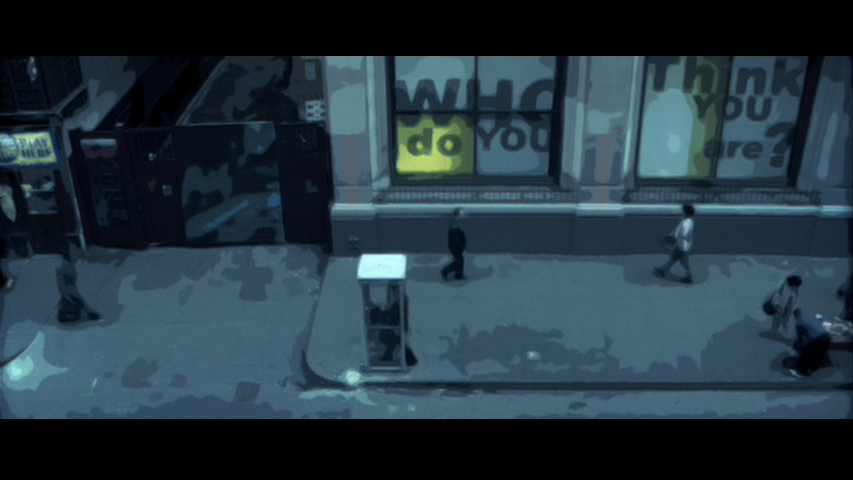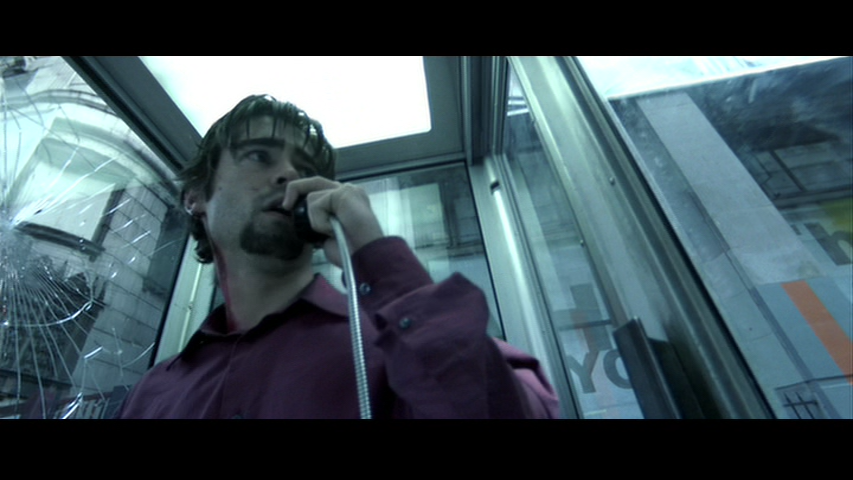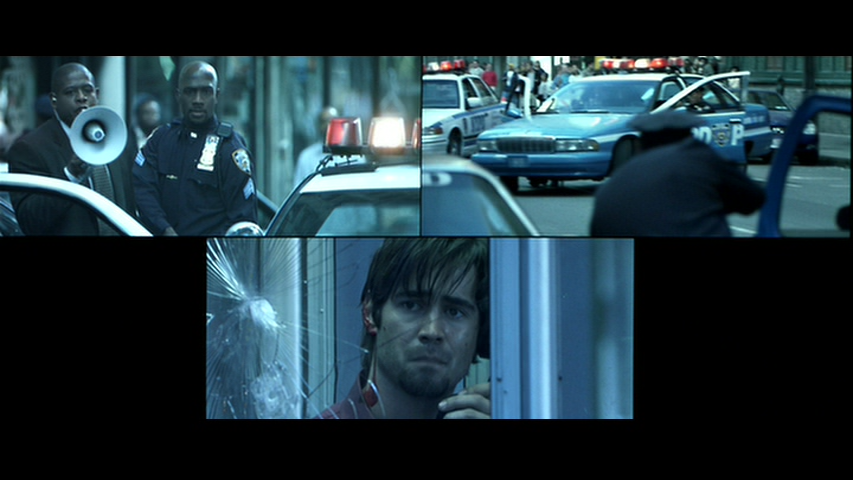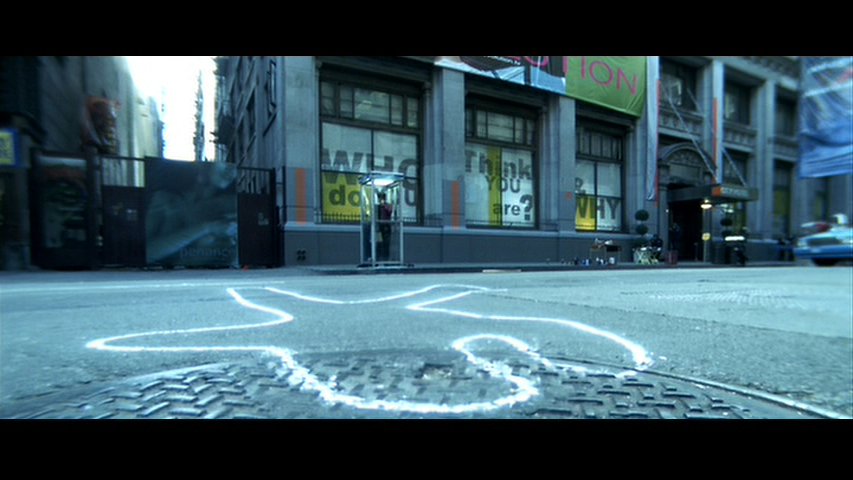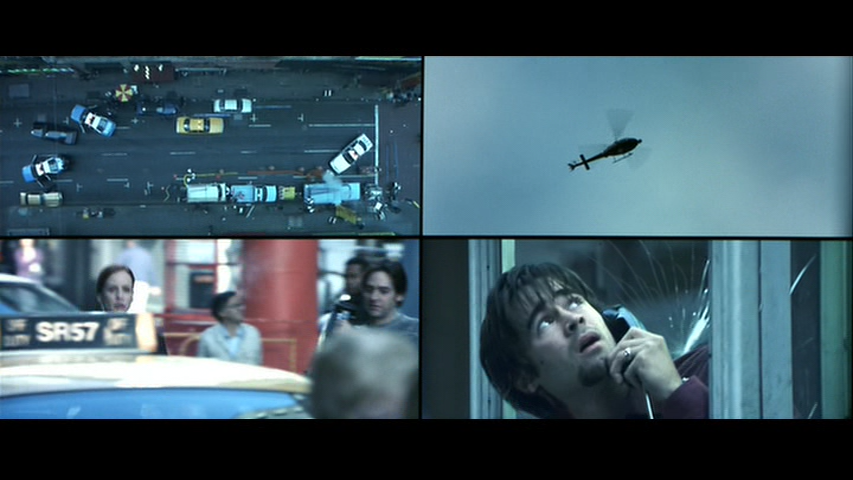Phone Booth (2002)
written by: Larry Cohen
starring: Colin Farrell, Forrest Whitaker, Radha Mitchell, Katie Holmes, and Kiefer Sutherland('s voice)
I got my first cell phone in 2004, at the earliest, I think. I was in high school, and my mom allowed it because my school got rid of the one pay phone we had in the main hall, and I needed a way to let my mom know if I was going to stay late, or etc. But I had liked the one pay phone very much. There was something viscerally satisfying about dropping in my coins (plink plink), pressing the buttons, holding the solid receiver in my hand. I still like to use phones with cords and real buttons, to this day.
Well, we all have cell phones now and the age of the pay phone is long past. Phone kiosks in New York now are simply places to stand.
Phone Booth sits exactly on that fine line between cellphone and pay phone. Technology has made timelessness near impossible. Watching the teens of Gossip Girl use their flip-keyboard phones is sure to cause a flash from the past for anyone my age. A movie that uses a Razr is clearly of 2004. Even early iPhones looks shockingly dated these days.
Enter: 2002's Phone Booth. The movie opens with three minutes of narration describing cell phone use in New York City-- I listened to the director's commentary included on my DVD of this movie, and Mr. Schumacher says the statistics are correct, for 2002, which is kinda cool-- and while I don't know a lot about those numbers, they seem small to me. But this was early in the age of cell phones, and so these statistics seem huge. The opening sequence is all people on phones, walking and talking. It's not an unfamiliar sight these days, but the way it's shot makes these handheld miracles seem like a looming, encroaching threat. Everywhere you look, there are more! more!
But the real threat of this movie is not cell phone related, but rather comes straight from a relic. We're introduced to Stu Shepard (Colin Farrell), a real asshole, who behaves like an asshole, treats his intern like an asshole, and then takes off his wedding ring to call a girl he wants to fool around with (Katie Holmes as Pam, very sweet and cute). He calls her from what we are told is the "last payphone in New York", on 53rd between Broadway and 8th (actually shot on 5th Avenue in Los Angeles). As soon as Stu hangs up, the pay phone rings again. And as we know, a ringing phone must be answered. So he answers it. On the other end is a mysterious voice that tells him if he hangs up or leaves the phone booth, he'll be killed. Trapped in a glass cage, Stu is confronted with an old fashioned morality that is now holding him accountable.
And that's the set up for the movie. There’s a story, true or not I don’t know, that Alfred Hitchcock had wanted to make a movie about a man trapped in a phone booth, but no one could figure out how to keep the guy there. I guess screenwriter Larry Cohen figured a sniper would do it. It's a slightly sweaty premise, admittedly, but with good performances and lively direction, it makes for a zippy little thriller. At only 80 minutes long, Phone Booth has no fat on it's bones. The trick is to keep it's locked-down location interesting to watch. Performances wise, this falls on the shoulders of Colin Farrell almost exclusively, as he progressively unravels under pressure. The rest of the cast helps too, especially Forest Whitaker as the cop who shows up after the sniper kills a man outside Stu's phone booth. As the caller, Kiefer Sutherland adds a level of steely gravitas to it, making the caller's nonsense motivations almost acceptable. It doesn’t take much to justify a serial killer in movies like this, and if you move fast enough, no one really questions it. That tactic is successful here.
It’s almost a proto-Saw, where the killer expects you to do right or die. There’s tension there, and it’s frightening because there’s a sense that it could happen to anyone, including you, at any moment. The series of events that leads to Stu being surrounded by police with rifles trained on him is mostly accidental— he’s not a great guy, but he’s not deplorable exactly either. He’s made a bad choice here or there, and then picked up the wrong phone. Next thing he knows, his life is on the precipice. It’s a sudden stumble over a sharp cliff. Watching it, you think, Well he deserves some of this…. but then, maybe so would I?
Really it comes down to Farrell’s performance. Colin Farrell, who is, as we know, a star, here successfully and in more-or-less real time transforms from a confident, swaggering shitbag to a crumbled, broken down, misery of a man. It happens fast, but naturally. Never do you feel an emotional turn is undeserved. He’s likeable enough that we want him to survive his ordeal, but shitty enough for us to know he needs it. From early on, you can watch his face start to tremble, and those trembles build and build until he has shaken himself to pieces. He panics, he shakes, he feels fear and anger and helplessness, and you watch it all played out on his face in tight closeups. His final monologue, where he confesses his sins to his wife, is beautifully delivered, shuddering and weepy without being melodramatic. What we see in the movie is famously the first (and only) take. This whole movie is an excellent use of Farrell’s amazingly expressive face and eyebrows. He can do more with a fluttering cheek than some people can do with their whole bodies.
Visually, Phone Booth feels like nearly a return to the stylistic extravagance of some of Schumacher’s earlier work. It's showy in a way that's fun, very lively and active. There are split screens, picture-in-picture, tight angled close-ups and beautiful wide shots. As the tension ramps up, the camera matches— cuts become more jarring, angles become more disorienting, the cramped space of the phone booth becomes inescapable. It’s impressive and playful, and very effective. Given the limitations of the location and story, this could easily become staid and stagey, trapped in it’s one location. Phone Booth keeps things constantly moving and active. Our viewpoint is sometimes with Stu, trapped in a tiny box, sometimes with the caller, looking down with a god’s eye view, and sometimes with the bystanders, looking from afar at ground level.
Most of the movie exists in this cold, washed out world— which just makes the few pops of color really stand out. The yellow on the “Who Do You Think You Are” sign behind the phone booth is stunning, the purple of Stu’s shirt stands out. It’s a good looking movie, and those little pops elevate it.
I also think the sound design is really strong— the phone calls have no scratchy phone noise on them at all, so the voiceover takes on a more immediate, unsettling quality. It’s like having Kiefer Sutherland whisper directly next to your ear, and it’s pretty freaky. Sometimes the voice overtakes every other sound. The street noise fades away, and all you can hear is that whisper. This too adds to the frightful tension of the movie. The rifle, when it is fired, is nearly silent, and that too adds to the unreality of the situation. I think that unreal quality is what makes Schumacher’s best works so good. There is a quality to all of them, Phone Booth included, that is fantastical. In this example, the balance of real and unreal leaves the viewer off-kilter, never quite sure what will happen next, because anything seems possible. The rules of the real world don’t quite apply here. Similarly, the real-time aspect of this movie is a fun gimmick, but it’s here presented so cinematically you almost forget about it. There are enough cuts and jumps, that even though time hasn’t passed you feel the weight of hours. I think that’s pretty impressive.
One side note: so I watched this movie with the director's commentary included on my DVD. On it, Joel Schumacher is the nicest human being I've ever heard speak, constantly and very genuinely complimenting and praising every single person who worked on the movie-- from the cinematographer to Colin Farrell to the guy who did their effects to the background actors. That level of kindness and generosity was breathtaking to me, and on top of all that, he's quite funny and charming! He clearly has a good attitude about the whole thing, and about all the shit he's taken for various other movies in his career, and he's not too miffed about any of it. Like water off a ducks back, he does his work in the way he likes, and shrugs off the negative chatter. So if I wasn't totally biased and warm towards him already, now I'm totally sold. Joel, my guy, my dude. I love him.
And Phone Booth is honestly a good little thriller: Fast, fun, and highly enjoyable.
Overall: ★★★★
Schumacherness: ★★★
Up next: Veronica Guerin (2003)

